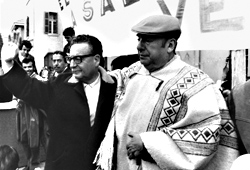For diehard student archaeologists of the fossilized left, even with a double major in Latin American history, Patricio Guzmán’s documentary about his political idol is still a dull appendix to his three-part Battle of Chile series (1975–79). He began that project even before the Sept. 11, 1973, military coup that overthrew the socialist coalition government led by President Salvador Allende, who committed suicide rather than surrender and face exile. It appears that some of the excellent period footage from his Battle trilogy is interpolated in this revolutionary paean, and it’s hard not to be moved by the exuberant street marches, giddy demonstrations, and popular sentiment that had—without machine guns, mind you—removed the old bourgeois elite from power.
It couldn’t last, of course, and Guzmán is so consumed with nostalgia for a system that nobody is hoping to revive today that he forgets to shape either a coherent biography of Allende (the man, not the icon) or a detailed, dirty analysis of how Nixon, Kissinger, and the CIA abetted his downfall. Candid interviews with then–U.S. Ambassador Edward Korry were evidently conducted by another journalist years after the fact, and his is the only voice to offer an outsider’s valuable perspective.
Perhaps most damning—in Nixon’s eyes, at least—are newsreel scenes here of Allende receiving the fatal bear hug and kiss from Fidel Castro (in his first foreign visit after the Cuban revolution). In one of his stem-winding speeches in a Santiago soccer stadium, Fidel shows his mastery at the podium with a wonderful little adjustment of the microphones in front of him—like Pavarotti cheating a breath midmeasure. The dictatorship of the proletariat is one thing; showmanship is another. Guzmán also includes footage of a Chilean street-cart vendor racing to some rally, balancing his load in the traces precisely so that his feet skim impossibly fast, almost weightless, on the pavement. It’s a perfect revolutionary moment of suspension, hope, gravity defeated.
Nothing else in the film matches it. In his narration, Guzmán says, “With Allende dead, everything died.” One can admire that his stubborn filmmaking didn’t likewise expire while still wishing he’d now turn his camera to the living. BRIAN MILLER








